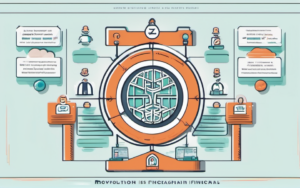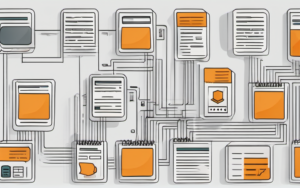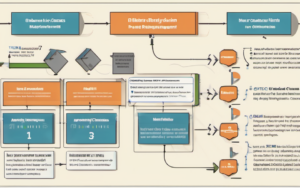The healthcare industry is on the cusp of a significant transformation, driven by the emergence of groundbreaking technologies like blockchain healthcare. This innovative technology has the potential to revolutionize the way we manage, share, and access medical information, paving the way for a more secure, efficient, and patient-centric healthcare system.
The Potential of Blockchain in Healthcare
Introduction: A New Era of Healthcare
Imagine a world where your medical records are always secure, accessible, and available to authorized healthcare providers instantly. This is the vision that blockchain technology brings to the healthcare industry. By leveraging the decentralized and tamper-proof nature of blockchain, we can create a new era of healthcare that prioritizes patient empowerment, data security, and improved efficiency.
The Challenges of Traditional Healthcare Systems
Traditional healthcare systems have been plagued by several challenges, hindering their ability to deliver optimal care.
Data Security and Privacy Concerns
The sensitive nature of medical data makes it vulnerable to breaches and misuse. Traditional systems often rely on centralized databases that are susceptible to cyberattacks and unauthorized access.
Interoperability Issues
The lack of standardized data formats and communication protocols creates silos between different healthcare providers, making it difficult to share patient information seamlessly.
Inefficient Processes and High Costs
Complex administrative processes, such as insurance claims processing and medical billing, contribute to high healthcare costs and delays in patient care.
Blockchain: A Game-Changer for Healthcare
Blockchain technology can address these challenges by providing a secure, transparent, and efficient platform for managing healthcare data and processes.
Enhanced Security and Privacy
Blockchain’s decentralized nature eliminates the need for a central authority, making it virtually impossible for hackers to gain access to sensitive data. Each transaction is encrypted and recorded on a distributed ledger, ensuring data integrity and immutability.
Improved Interoperability and Data Sharing
Blockchain enables seamless data sharing between healthcare providers, facilitating better coordination of care and reducing the risk of medical errors. This improved interoperability enhances the efficiency and effectiveness of healthcare services.
Streamlined Processes and Reduced Costs
Blockchain can automate administrative tasks, such as claims processing and medical billing, reducing administrative overhead and freeing up healthcare professionals to focus on patient care. This streamlined approach can significantly reduce healthcare costs.
Key Applications of Blockchain in Healthcare
Electronic Health Records (EHRs)
Secure and Tamper-Proof Patient Data
Blockchain can provide a secure and tamper-proof platform for storing and managing electronic health records (EHRs). Each record is encrypted and stored on a distributed ledger, ensuring that it remains unaltered and accessible only to authorized individuals.
Improved Data Accessibility and Sharing
Blockchain allows patients to control access to their medical records, empowering them to share their data with healthcare providers and researchers as they see fit. This enhanced data accessibility can lead to more accurate diagnoses and personalized treatment plans.
Supply Chain Management
Tracking Pharmaceutical Products
Blockchain can be used to track pharmaceutical products from their origin to the point of sale, ensuring transparency and accountability throughout the supply chain. This traceability helps prevent counterfeit drugs from entering the market, safeguarding patient safety.
Ensuring Drug Authenticity and Safety
Blockchain can authenticate the origin and quality of pharmaceutical products, reducing the risk of adulterated or expired medications. This enhanced security can improve patient outcomes and minimize the risk of adverse events.
Clinical Trials and Research
Secure and Transparent Data Management
Blockchain can facilitate secure and transparent data management for clinical trials. By storing patient data on a distributed ledger, researchers can ensure data integrity and confidentiality while enabling secure access for authorized participants.
Accelerated Research and Development
Blockchain can streamline the clinical trial process by automating tasks such as data collection and analysis, leading to faster research and development cycles. This accelerated research can bring new therapies and treatments to patients more quickly.
Insurance and Claims Processing
Automated Claims Verification and Fraud Prevention
Blockchain can automate the verification of insurance claims, reducing the risk of fraud and speeding up the claims processing time. This streamlined process improves efficiency and reduces administrative costs.
Telemedicine and Remote Patient Monitoring
Secure and Reliable Data Transmission
Blockchain can enable secure and reliable data transmission for telemedicine and remote patient monitoring. This allows healthcare providers to monitor patient health remotely and intervene quickly in case of emergencies.
Enhanced Patient Engagement and Care
Blockchain can improve patient engagement by providing them with access to their health data and enabling them to participate in their own care. This empowers patients to make informed decisions about their health and well-being.
Benefits of Blockchain in Healthcare
Increased Transparency and Trust
Blockchain’s transparent and immutable nature fosters trust and accountability within the healthcare system. Patients can be confident that their data is secure and that healthcare providers are adhering to ethical standards.
Improved Patient Empowerment
Blockchain empowers patients by giving them control over their medical records and allowing them to share their data with healthcare providers as they see fit. This enhanced patient agency fosters trust and collaboration within the healthcare ecosystem.
Reduced Costs and Increased Efficiency
Blockchain can streamline healthcare processes, reducing administrative costs and freeing up healthcare professionals to focus on patient care. This increased efficiency can lead to improved outcomes and reduced healthcare expenditures.
Enhanced Data Security and Privacy
Blockchain’s robust security features protect patient data from breaches and unauthorized access. This enhanced data security fosters patient trust and confidence in the healthcare system.
Challenges and Considerations
Scalability and Interoperability
As blockchain technology continues to evolve, scalability and interoperability remain key challenges for its widespread adoption in healthcare. Ensuring that blockchain networks can handle large volumes of data and integrate seamlessly with existing healthcare systems is crucial.
Regulatory and Legal Frameworks
The adoption of blockchain in healthcare requires clear regulatory and legal frameworks. Developing comprehensive guidelines for data security, privacy, and patient consent is essential to ensure ethical and responsible use of blockchain technology.
Adoption and Implementation
The successful adoption of blockchain in healthcare requires collaboration between healthcare providers, technology companies, and policymakers. Overcoming resistance to change and facilitating the implementation of blockchain solutions will be critical for its widespread adoption.
The Future of Blockchain in Healthcare
Emerging Trends and Innovations
The healthcare industry is witnessing the emergence of innovative blockchain applications, including decentralized identity management, secure medication dispensing, and patient-controlled data sharing platforms. These advancements are driving further innovation and adoption of blockchain technology.
The Role of Artificial Intelligence (AI)
The integration of artificial intelligence (AI) with blockchain has the potential to transform healthcare. AI-powered applications can leverage blockchain’s secure and transparent data infrastructure to enhance diagnostics, personalize treatment plans, and optimize healthcare delivery.
A Vision for a More Connected and Secure Healthcare System
The future of healthcare envisions a more connected and secure healthcare system powered by blockchain technology. This vision encompasses improved patient outcomes, reduced healthcare costs, and increased patient empowerment, ushering in a new era of personalized and efficient healthcare.
The transformative potential of blockchain healthcare is undeniable. By addressing the challenges of traditional healthcare systems and leveraging its unique capabilities, blockchain technology can pave the way for a more secure, efficient, and patient-centric healthcare system. The future of healthcare is bright, and blockchain is poised to play a pivotal role in shaping this future.




